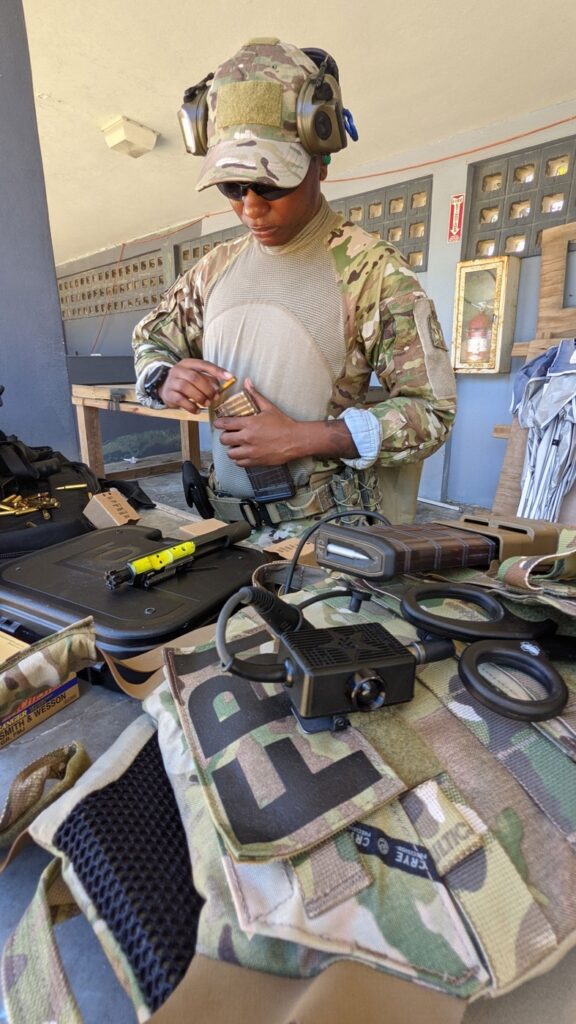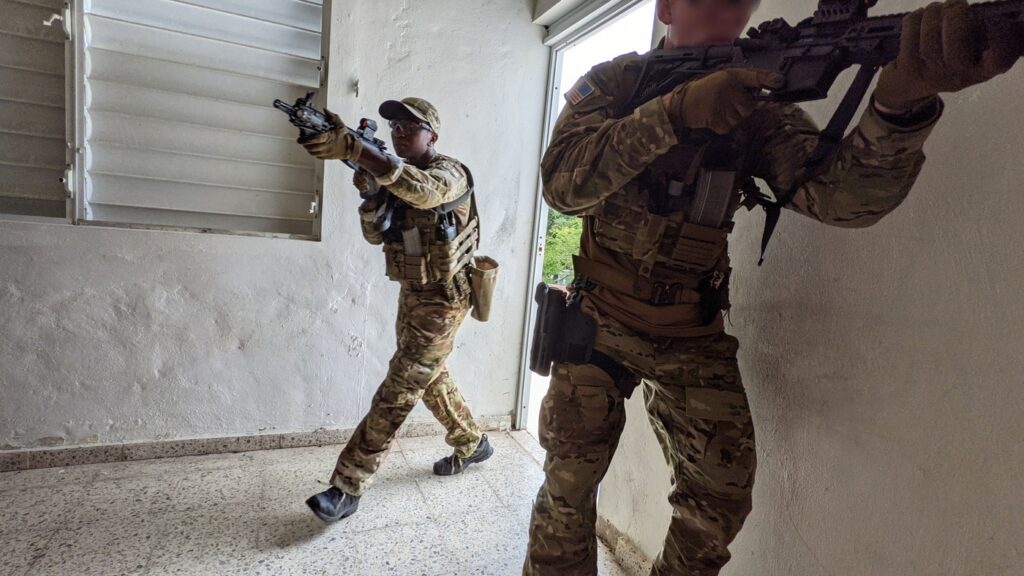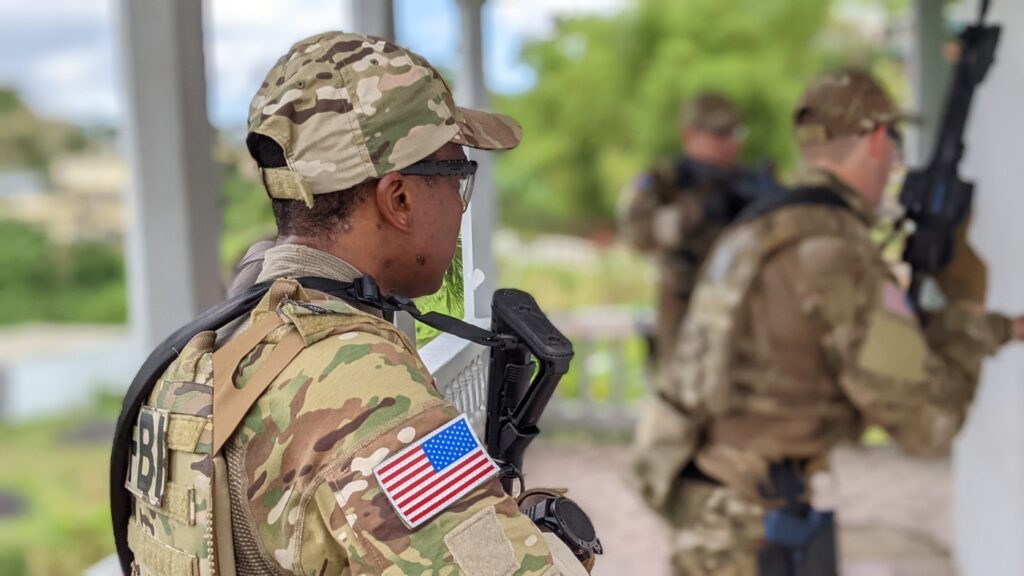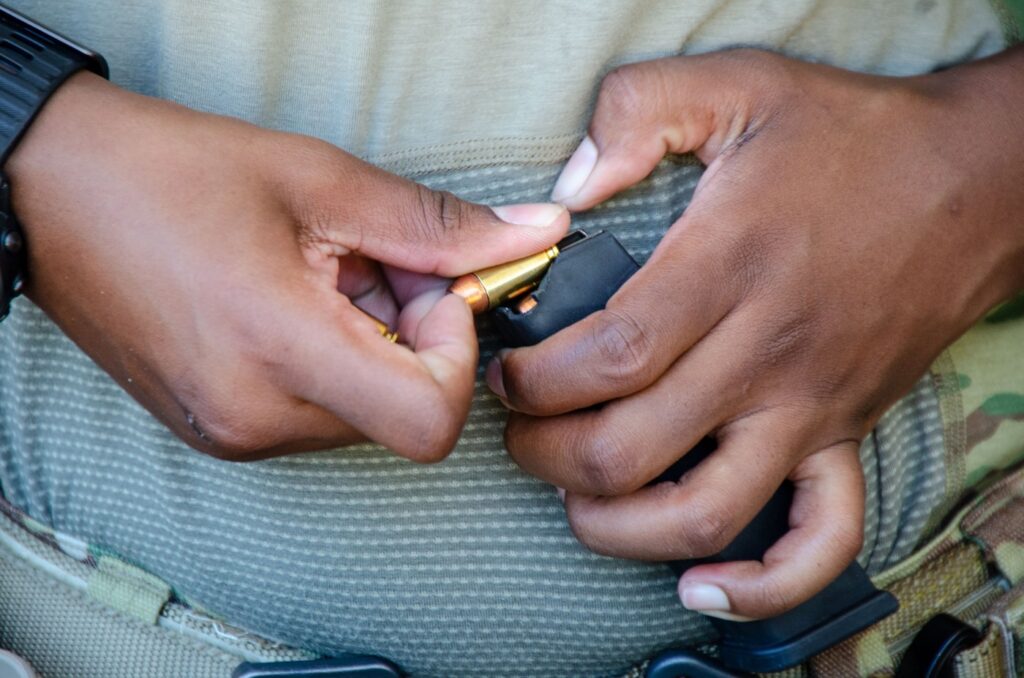It was day one of New Operator Training School, or NOTS, a 10-week proving ground for selectees to the San Juan Division’s SWAT team, which is among the busiest of the FBI’s 56 field office teams. Tai and four other special agents would spend the day—and the next nine Fridays—practicing, refining, and repeating how to safely enter rooms and effectively handle SWAT firearms. Each of the agents had something to prove—that they belonged there. For Tai, who is believed to be the first African American woman in the Bureau’s history to be selected for an FBI SWAT team, the weight of the milestone wasn’t on her mind; on this humid May morning, she was singularly focused on clearing rooms, hitting targets, and moving and thinking in fluid synchronicity with her teammates.
“I’m one of those people where I have a task at hand and I just focus on that task,” said Tai, whose last name we are withholding. “I don’t really think about people looking at me.”
Tai, who is also a soldier in the U.S. Army Reserve, joined the FBI four years ago and has spent her career in Puerto Rico working corruption cases involving non-elected officials. Before the FBI, she was a deputy for five years in the Orange County Sheriff’s Office in Orlando, Florida. She was drawn to the FBI after seeing the Bureau’s response to a mass shooting in 2016 at the Pulse nightclub in Orlando, where 49 people were killed. “The amount of assets and the professional attitude of agents,” she said. “They were organized, and they got stuff done.”
One of Tai’s fellow Army Reserve officers suggested that she would be a good FBI agent. She applied, went through new agent training, and was assigned to the San Juan Field Office in 2017. Almost four years later, Tai and four other agents were sweating under the heat of a tropical sun, tactical vests, and the exacting scrutiny of field-hardened instructors training up a new cadre of SWAT operators.
“We want everyone to get through NOTS,” said Special Agent Owen Reese, a SWAT operator leading the training course. “But we’re also prepared to tell someone, ‘Hey, you’re not getting it. Maybe this isn’t the right job for you.’ Because it’s not for everybody.”

San Juan’s SWAT team is among the busiest of the FBI’s 56 field office teams.
The 10-week NOTS course prepares SWAT selectees for operations (SWAT stands for special weapons and tactics). The training crucible makes them more proficient at firearms, body movement, and critical thinking in stressful situations. If they pass, Reese said, they join their field office’s SWAT team as probationary members—meaning they can do everything except enter houses. Probation may last six to 18 months as the new operators gain experience. They are then sent to SWAT Basic at the FBI Training Academy in Virginia, where new operators from all the FBI’s field offices go through three weeks of training to get officially certified by the body that oversees FBI SWAT operations, the Critical Incident Response Group.
“The training is standardized to make sure everyone’s on the same baseline—that we’re all doing the same thing,” Reese said. “They want someone to be up to speed for Basic and be able to pass Basic. But for our team, we’re not focusing on just passing Basic. We want them to go and crush Basic.”
Tai isn’t thinking about SWAT certification yet. It’s a long way off. And it’s early days at NOTS, so nothing is certain. When asked about breaking through barriers—figuratively—as the first Black female agent selected for SWAT, she acknowledged that her path thus far might inspire others.

“Hopefully somebody will see that I was able to do it,” Tai said, during a short break between close-quarters battle training and firearms practice. “I’m not the biggest person. I’m not as strong as some of these guys. But as long as you have perseverance—because it does get really tough—you push through it and keep going.”
Persevering was a big part of Tai’s growing up in a rough neighborhood outside Tampa, Florida. Drugs and crime were constants, and Tai insulated herself by focusing on school and extracurricular activities like band, soccer, and track. “It kept me on a good path,” she said.
One day she saw U.S. Marshals deputies in her neighborhood serving a warrant. One of them was a Black female—the first she had ever seen wearing a badge. Tai approached her, asked her about it, and received the deputy’s business card to keep in contact—a moment that has stuck with Tai.
San Juan SWAT Senior Team Leader Mike Dubravetz, who has been an agent for 18 years, said those kinds of early impressions can set someone’s future course.
“If somebody wouldn’t have come to me at one point in my young days and said, ‘Mike, you should try out for SWAT’ and me not thinking it was ever for me, I probably never would have done it,” said Dubravetz. “I’d be somewhere different. And people seeing that there are opportunities like Tai has, it just opens up doors for people who may not know that those opportunities exist.”
Tai’s successes in high school earned her a scholarship to Bethune-Cookman University, a historically Black university in Daytona Beach. There she studied criminal justice, with an eye toward becoming a police officer.

Tai’s ROTC instructor in college, Maj. Earl Filmore, Jr., isn’t surprised that his former cadet sergeant major is carving out a place at the FBI. He saw Tai’s leadership qualities emerge as a student and drumline member, and then as an Army Reserve officer.
“The big thing about her is her mental fortitude,” said Maj. Filmore, director of military affairs at Bethune-Cookman. “She’s really resilient. She’s got all the characteristics you would want in a good FBI agent and also the characteristics you want in an Army officer.”
“I like to help,” Tai said, recalling her days with Orange County Sheriff’s Office. “Even on patrol, I’d always say that jail isn’t always the answer. Sometimes someone just needs to be listened to or things can be worked out. That’s just part of listening and trying to help the community that I was serving.”

In Puerto Rico, where violent crime is one of the biggest challenges for law enforcement, Tai is hoping she can help her community in more ways by adding SWAT to her responsibilities (for most agents, SWAT is a secondary or collateral duty). It’s still early, but Special Agent Dubravetz sees a lot of promise in Tai.
“There are no guarantees for success, but she’s been willing to tackle this,” he said. “I’m impressed with her performance. She wouldn’t have made it through the selection process if she didn’t demonstrate that she has what it takes to be successful.”
For Tai, it’s important now to focus on just making the team. She’s reluctant to place herself among the Bureau’s firsts—like Sylvia Mathis and Linda Berry, the first Black female agents in 1976. But she appreciates the groundwork that helped her get where she is today—squeezing high-capacity rounds into a rifle magazine with her fellow NOTS selectees.
“I’m definitely thankful for all the Black women before me in the FBI,” Tai said. “Because if it didn’t start with that one, who knows how many there would be today, if any. I’m definitely grateful for all of them before me.”

